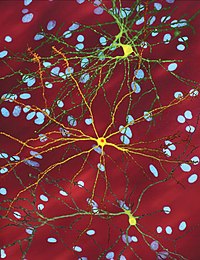
Photo from wikipedia
Neurological and psychiatric disorders are leading contributors to the global disease burden, having a serious impact on the quality of life of both patients and their relatives. Although the molecular… Click to show full abstract
Neurological and psychiatric disorders are leading contributors to the global disease burden, having a serious impact on the quality of life of both patients and their relatives. Although the molecular events underlying these heterogeneous diseases remain poorly understood, some studies have raised the idea of common mechanisms involved. In excitotoxicity, there is an excessive activation of glutamate receptors by excitatory amino acids, leading to neuronal damage. Thus, the excessive release of glutamate can lead to a dysregulation of Ca2+ homeostasis, triggering the production of free radicals and oxidative stress, mitochondrial dysfunction and eventually cell death. Although there is a consensus in considering excitotoxicity as a hallmark in most neurodegenerative diseases, increasing evidence points to the relevant role of this pathological mechanism in other illnesses affecting the central nervous system. Consequently, antagonists of glutamate receptors are used in current treatments or in clinical trials in both neurological and psychiatric disorders. However, drugs modulating other aspects of the excitotoxic mechanism could be more beneficial. This review discusses how excitotoxicity is involved in the pathogenesis of different neurological and psychiatric disorders and the promising strategies targeting the excitotoxic insult.
Journal Title: Journal of Psychopharmacology
Year Published: 2018
Link to full text (if available)
Share on Social Media: Sign Up to like & get
recommendations!